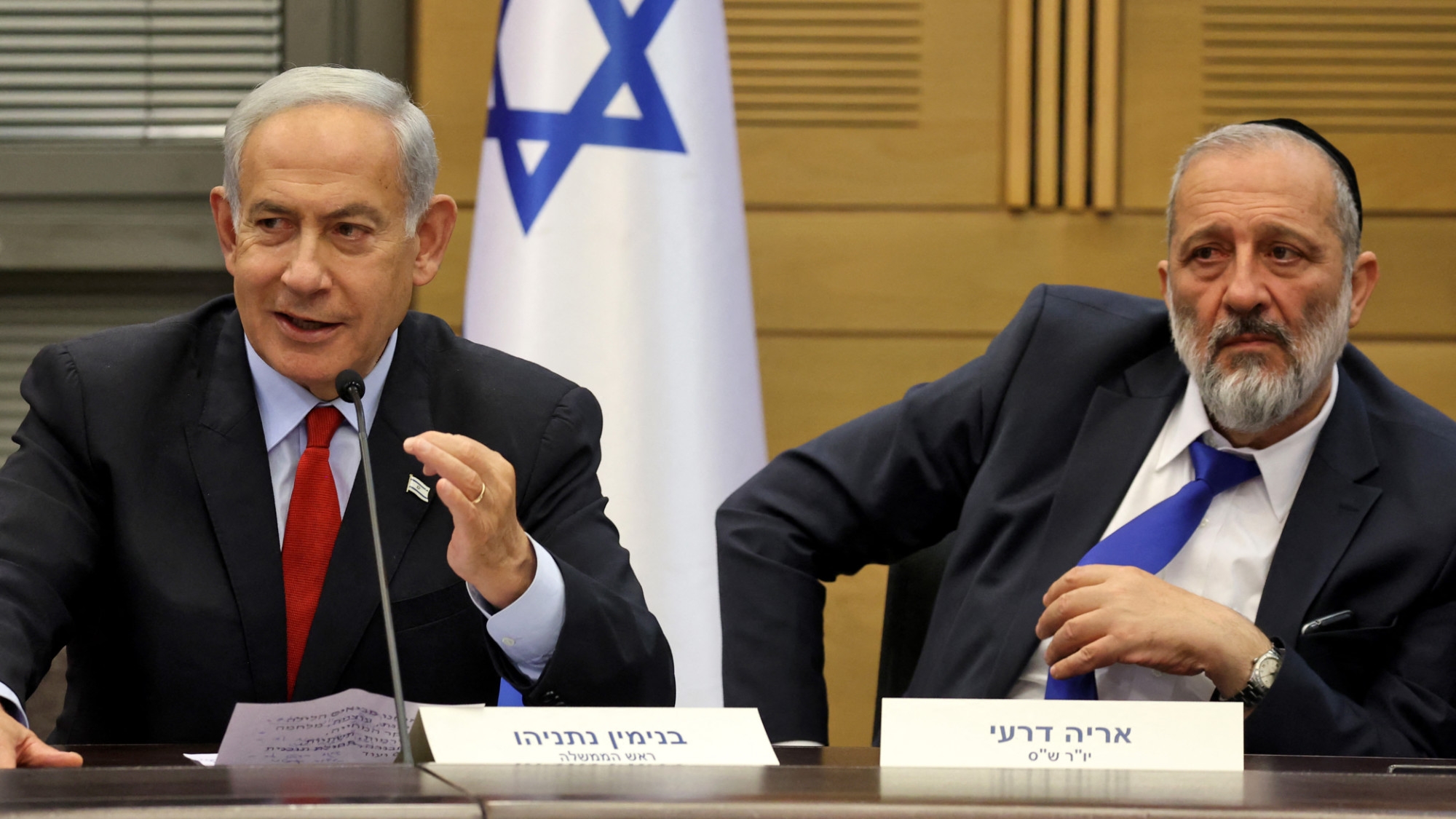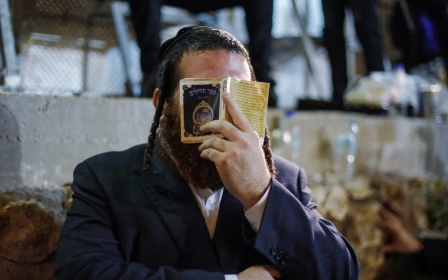Israel: Netanyahu's coalition in crisis as partners quarrel over divisive ‘rabbis bill’

A divisive bill has thrown Israel’s government into turmoil as key ultra-Orthodox members threatened to bring it down.
The contentious bill, sought by the religious party Shas, aims to give the government control over the appointment of municipal rabbis at the expense of local authorities.
It faced opposition from within the governing coalition on Wednesday, including members of Prime Minister Benjamin Netanyahu’s Likud and Security Minister Itamar Ben Gvir’s Otzma Yehudit far-right party.
Fearing it lacked the required majority, Netanyahu pulled it from the parliamentary agenda hours before a vote on the legislation was due.
Reacting to the move, a Shas official told Kan public news broadcaster that the government’s collapse was “inevitable” and “only a matter of time”.
New MEE newsletter: Jerusalem Dispatch
Sign up to get the latest insights and analysis on Israel-Palestine, alongside Turkey Unpacked and other MEE newsletters
Shas leader Aryeh Deri, a key ally of Netanyahu, told the premier on Tuesday that the government would fall if the law is foiled, a source told Channel 12.
The unnamed Shas official who spoke to Kan expressed frustration over the lack of cohesion within the coalition.
“There is no coalition, no discipline, and the most frustrating thing is that the Likud is a party made up of 35 separate factions,” he said.
Critics say the legislation, dubbed the "rabbis bill", would weaken the influence of women in the process of selecting rabbis and benefit Shas members with job opportunities. They also say the timing is unsuitable amid wars in Gaza and Lebanon.
Two Likud lawmakers, Tally Gotliv and Moshe Saada, were set to be removed from the parliamentary committee in charge of discussing the bill due to their opposition.
Another MP who sits on the committee, Yitzhak Kroizer of the Otzma Yehudit, publicly said he was against the bill.
Gotliv attacked the decision to remove her by a fellow Likud lawmaker.
"Likud voters, I am ashamed that coalition chairman Ofir Katz is a pawn of Dery and Netanyahu… It's in your hands to choose brave Knesset members who work for you, and not for Aryeh Dery and [Finance Minister Bezalel] Smotrich, who enact the corrupt jobs law during wartime. Disgusting,” she said.
Snowballing disagreements
Disagreements over the bill snowballed into a public quarrel involving the parties of Ben Gvir, Dery and Netanyahu.
Ben Gvir’s Otzma Yehudit accused Dery’s Shas and Netanyahu’s Likud of striking a deal with Mansour Abbas, an opposition Arab party leader, to abstain from voting at the committee to boost the chances of getting a majority.
Shas denied the allegation in a statement as “a complete lie” and accused Ben Gvir of “spreading lies to blackmail Shas into accepting the appointment of rabbis he desires, or the appointment of one chief rabbi or another”.
It added: “Shas expects that the coalition agreement signed with it will be fulfilled, and if Itamar Ben Gvir decides to violate coalition discipline and vote against the law, the responsibility will be solely on him.”
On Wednesday, Israeli media reported that Netanyahu offered to include Ben Gvir in a small body of cabinet ministers to receive security updates in exchange for his support of the “rabbis bill”.
In response, Likud said the articles were “full of inaccuracies” and appeared to publicly rebuke Ben Gvir for “leaking state secrets”.
“Prime Minister Netanyahu told Minister Ben Gvir one simple thing: whoever wants to be a partner in a limited security consultation team must prove that he is not leaking state secrets or private conversations,” Likud said.
Otzma Yehudit replied by suggesting that Netanyahu was involved in media leaks himself.
The far-right party called on the prime minister to “quickly promote” a law requiring cabinet members to undergo polygraph tests, provided it also “applies to owners of a pacemaker”, in an apparent reference to Netanyahu, who had a pacemaker fitted last year.
Yair Lapid, leader of the opposition, said on social media platform X: “I read what Bibi [Netanyahu] said about Ben Gvir, and what Ben Gvir said about Bibi, and I agree with both.”
The opposition National Unity alliance, headed by former war cabinet minister Benny Gantz, also criticised Netanyahu.
'We are in a multi-front war and we face great challenges and difficult decisions. We must all focus only on defeating Hamas'
- Benjamin Netanyahu
“Someone who believes that there is a minister leaking state secrets should not give him control over the Israel Police and membership in the cabinet,” it said, referring to Ben Gvir, who is the minister of national security, which oversees the police.
Amid the turmoil, Netanyahu published a video urging coalition partners to “recalibrate” and said it was “not the time for petty politics”.
“We are in a multi-front war and we face great challenges and difficult decisions,” he said.
“We must all focus only on defeating Hamas, returning all the hostages, and bringing the population back to their homes safely in the north and south.”
Tensions within the coalition are likely to grow as another bill concerning the exemption of ultra-Orthodox men from military service is set to be brought for a parliamentary vote soon.
Economy Minister Nir Barkat, a senior Likud member, said on Wednesday that he would oppose the current text of the bill, joining Defence Minister Yoav Gallant’s opposition to the legislation.
Ultra-Orthodox leaders and rabbis have previously threatened to quit the government if a bill that removes the exemption is passed.
Middle East Eye delivers independent and unrivalled coverage and analysis of the Middle East, North Africa and beyond. To learn more about republishing this content and the associated fees, please fill out this form. More about MEE can be found here.






